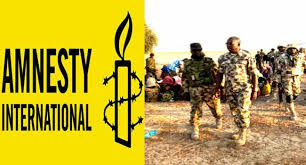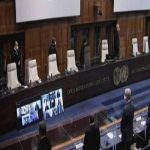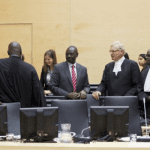Amnesty International on Monday urged the International Criminal Court to start a full-blown investigation into atrocities committed in the Boko Haram insurgency, accusing Nigeria of failing to bring those responsible to justice.
Amnesty International suggested Abuja was keeping her “in limbo” by giving the impression of domestic action but in reality doing very little.
“Eight years since the opening of the preliminary examination and faced with the continuing commission of crimes under international law and the possibility of a never-ending preliminary analysis, it is time for the OTP (Office of the Prosecutor) to open a formal investigation in Nigeria,” it said.
There was no immediate response from the government or military. But both have previously dismissed accusations from Amnesty as being without foundation.
Central to the human rights group’s argument is Nigeria’s investigations into alleged military atrocities and its prosecution of thousands of Boko Haram suspects.
None of the more than 20 government inquiries launched into claims of abuse by troops and civilian militia members in the last nine years has led to formal investigations and prosecutions, it pointed out.
Instead, the proceedings appeared designed to provide a “veneer of accountability” and exonerate senior officers and “shield persons concerned from criminal responsibility”, it alleged.
At the same time there had been a “minimal” number of prosecutions against mid- to high-ranking Boko Haram members for serious crimes such as terrorism, murder or hostage-taking.
The report said mass trials of more than 1,000 suspects that began in October 2017 were a “sham” designed to provide “legal cover” for those held in prolonged, arbitrary and unlawful detention.
Prosecutions were based on unreliable and untested confessions or guilty pleas, while defendants had a lack of access to lawyers and trials were rushed through.
Most of those on trial were acquitted due to lack of evidence or walked free because of time already served in custody. The majority appeared to be civilians caught up in the conflict.
Amnesty said Nigeria had failed to meet its obligations under international law to investigate and prosecute crimes as part of the ICC’s preliminary examination.
Further delays to a formal investigation “will allow further destruction and decay of evidence”, it added in the 74-page report.
“It is in the interests of both the OTP and Nigeria to demonstrate that serious steps are being taken to cure Nigeria’s inability or unwillingness to bring perpetrators to justice,” it said. “Above all it is in the interest of victims.”













